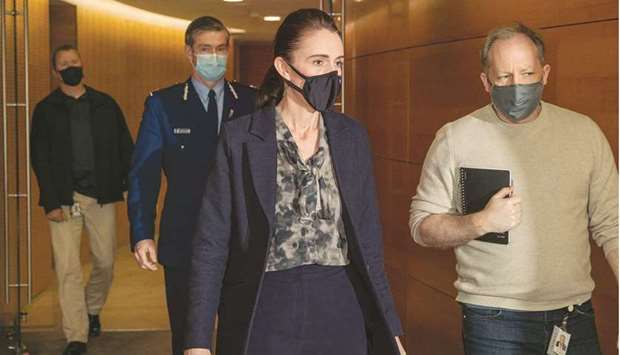Ardern said earlier the man was inspired by the Islamic State militant group and was being monitored constantly but could not be kept in prison by law any longer. “I am committing, that as soon as parliament resumes, we will complete that work — that means working to pass the law as soon as possible, and no later than by the end of this month,” Ardern told a news conference.
The Counter Terror Legislation Bill criminalises planning and preparation that might lead to terror attack, closing what critics have said has been a loophole allowing plotters to stay free. But Ardern said it would not be fair to assume that the tighter law would have made a difference in this case. “This was a highly motivated individual who used a supermarket visit as a shield for an attack. That is an incredibly tough set of circumstances,” she said.
Ardern said the attacker came to the attention of the police in 2016 because of his support for a violent ideology inspired by Islamic State. Police were following the man when he went into the Countdown supermarket in New Lynn mall in Auckland. They said they had thought he had gone in to do some shopping but he picked up a knife from a display and started stabbing people. Police said they shot him within a minute of the start of the attack. Ardern said the man arrived in New Zealand in 2011 on a student visa and was not known to have held any extreme views.
He came to the attention of police in 2016 after he expressed sympathy on Facebook for militant attacks, violent war-related videos and comments advocating violent extremism. In May 2017, he was arrested at Auckland’s airport where authorities believed he was travelling to Syria. He was charged after restricted publications and a hunting knife were discovered at his house but was released on bail.
In August 2018, he again bought a knife and was arrested and jailed. He was released into the community in July this year when surveillance began, Ardern said. Ardern was briefed on the case in late July and again in late August and officials, including the commissioner of police, raised the possibility of expediting the amendment to the counter-terrorism legislation.
Ardern said she wanted to explain why the attacker had not been deported but could not because to do so would violate court suppression orders, which also prevented her from identifying, him, she said. But she said had no intention of naming him anyway. “No terrorist, whether alive or deceased, deserves their name to be shared for the infamy they were seeking,” she said.
New Zealand supermarket group Countdown said on Saturday it had removed knives and scissors from its shelves while it considers whether it would continue to sell them.
“We want all of our team to feel safe when they come to work,” said Kiri Hannifin, Countdown’s general manager for safety said in a media statement. Other supermarket chains had also removed sharp knives from their shelves, media reported.
Sri Lanka offers help with knife attack probe
Sri Lanka will co-operate with New Zealand’s investigation into a knife rampage by an assailant from the South Asian nation, authorities said yesterday. Police shot dead the 32-year-old Sri Lankan after he attacked seven people in an Auckland supermarket on Friday. The man had been living in New Zealand since 2011.
“Sri Lanka condemns this senseless violence, and stands ready to co-operate with New Zealand authorities in any way necessary,” foreign ministry spokesman Kohularangan Ratnasingam said in the Sri Lankan government’s first comment on the incident. Ratnasingam commended the quick response of New Zealand authorities in dealing with the attacker.
Sri Lankan police sources said criminal investigators had already interviewed the attacker’s brother, who lives in Colombo, and were looking into all possible links. “We are collecting information about him as well as anyone else who may have had contacts with him,” a top police official said, adding there were no records of the attacker visiting Sri Lanka recently.
The South Asian country is still scarred by suicide attacks on three churches and three hotels on Easter Sunday in 2019 that left 279 dead. Some of the attackers came from the same eastern province as the Auckland attacker. The 2019 bombings were blamed on a group that pledged allegiance to the then Islamic State leader Abu Bakr al-Baghdadi.
Sri Lanka’s Muslim Council has condemned the Auckland attack as a “barbaric act of terrorism,” and thanked New Zealand police for their swift response. “This reminds all of us to come together and be united and fight against terrorism and violent extremism locally and internationally for the betterment of everybody,” council member Mohamed Hisham told AFP.
Sri Lankan Muslim legislator Mujibur Rahman said his community was saddened by the attack, while lauding New Zealand Prime Minister Jacinda Ardern for easing public sentiment. “Her statement soon after the incident defused the situation and ensured there was no harm to the Sri Lankan community (in New Zealand),” Rahman told AFP.
Ardern insisted that no one community should be singled out for the violence.
“It was carried out by an individual, not a faith, not a culture, not an ethnicity,” Ardern said.
“He alone carries the responsibility for these acts.”

A forensic police officer is seen outside the Masjid-e-Bilal mosque in Auckland, the day after an IS-inspired attacker injured six people in a knife rampage at a supermarket before being shot dead by undercover police.

Police Commissioner Andrew Coster speaks at a press conference.

